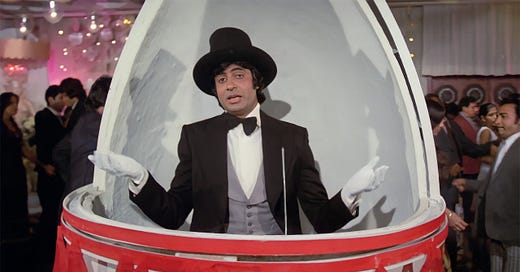Democracy Is Like That Only
In the run-up to 2024 elections, democracy was one election away from having a formal obituary written for it. Instead a perennially wise janta said, “Excuse me, please.”
Every seat in a Lok Sabha election tells a story. On a Tuesday full of surprises, the story that had me captivated was one coming in from the Faizabad constituency in Uttar Pradesh. That BJP would lose Ayodhya in an election where its biggest poll plank was the construction of a Ram Mandir felt like a Hindi film storyline that even Manmohan Desai would call unrealistic. And yet it was an undeniable verdict. The fanfare of a temple overlooking basic needs for survival had caused anger, disillusionment, and a feeling of injustice. Twitter asked, “What happened?” People replied, “It’s called democracy, yaar.”
To be fair, the country needed reminding. Over the last ten years, democracy has often felt like a beautiful abstract concept rather than an everyday reality with consequences. Neighbourhood uncles and their WhatsApp messages talking about the benefits of dictatorship. Prime time anchors and their bosses heralding a Prime Minister as king. Often, both doing so interchangeably.
If democracy in India were a Bollywood celebrity, then over the last ten years, rather than being “spotted” by Viral Bhayani regularly, it was relegated to a “Where Are They Now?” listicle. (“Number 3 will make you nostalgic for coalition governments.”) In the run-up to 2024, democracy was one election away from having a formal obituary written for it.
Instead what happened was this.
A country reiterating its belief in the Gandhian idea of self-rule. A people reminding those in power of the first line of the Constitution. And a perennially wise janta saying, “Haan, we believe in different Gods, speak different languages, and occasionally fight over who has the best street food online, but we’re very much Indian only, thank you.”
If the above paragraph seems far too romantic for an election verdict that still delivered the same government since 2014, some context. Firstly, it’s not the same government. There’s a difference between loudly declaring 350+ seats, making plans for a 1000-year reign, taking over institutions to do your bidding, and then having to rely on allies to form a government.
Secondly, and perhaps more crucially, look at the factors despite which the people got to have their say. A servile media. Opposition leaders in jail or with frozen bank accounts. The worst kind of hate speech. A slow erosion of the secular fabric of this country. Like many have been saying since 4th June, this is a shot at revitalising democracy despite; not because.
Thirdly, look at what the election gave us. A coalition government, a strong Opposition, the return of Parliamentary debates, a robust (digital) media, and a reminder that people are keeping close watch. These are all good things to happen in any country. But especially to a country as diverse, noisy, and chaotic as ours. There is still a lot of work to be done. What we need going forward is constant work to repair what’s lost, to safeguard what we have, and to hold accountable those who let us down. (TV anchors, hum dekh rahein hain.) But hope is not a dangerous thing anymore.
While watching the election results on Tuesday, I kept thinking of one Hindi film scene. Since I mostly write on cinema, this is no surprise. But the film I was thinking of was not traditional Independence Day/Republic Day fare. But “Amar, Akbar, Anthony” which of course, is its own kind of patriotic cinema. Specifically, the opening credits where Amitabh Bachchan, Vinod Khanna, and Rishi Kapoor — who are brothers from three different religion as the film later reveals — donating blood to Nirupa Roy while the song “Maa Sirf Naata Nahi” plays in the background.
Since the election results, every time I read an op-ed, listen to an expert, or even try to articulate what comes next, I think of that scene. Because sometimes well-constructed arguments driven by logic are inadequate to describe exactly the contours of abstract hope — hope that exists even though rationally you know things are more complex.
Sometimes, you just need a Manmohan Desai-sized rhetoric. You know it’s silly. You know it’s not how things always happen.
You still tear up. And despite everything, you still smile.
Hello, hello - I think it’s hilarious that my last post here was an essay on hope, and then look what happened. Maybe my next should be on a long vacation in the hills? Anyway, I hope you’re doing well. If you liked what you read, reply to this email. If you didn’t like it, well, it’s a free country and aaj kal toh opposition ka zamaana bhi hai.
I’ll write again, soon.





Hello
Loved how people said, "Dev-bhakt hain, andh-bhakt nahi!". 🙌🙇♀